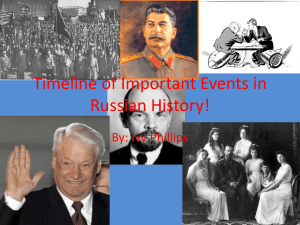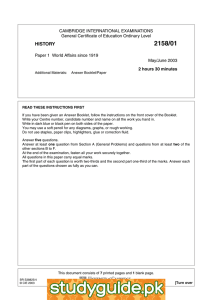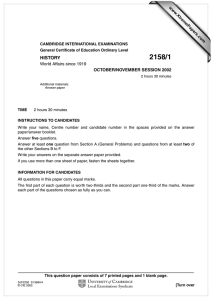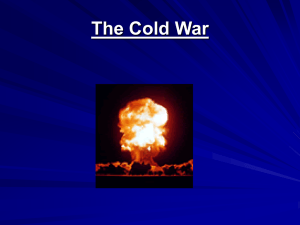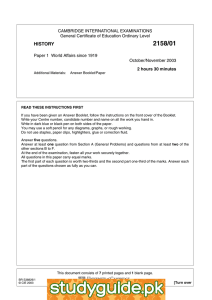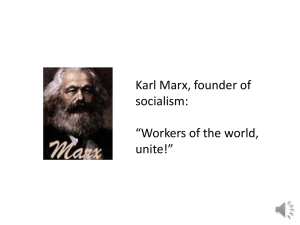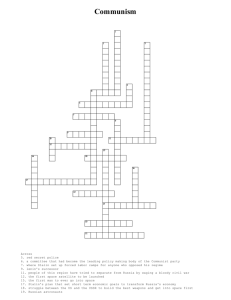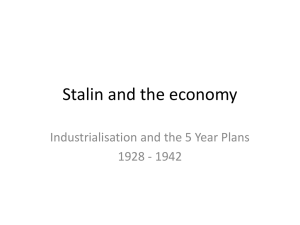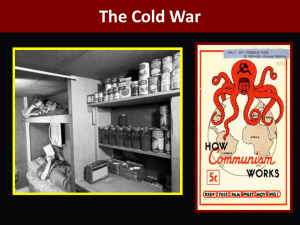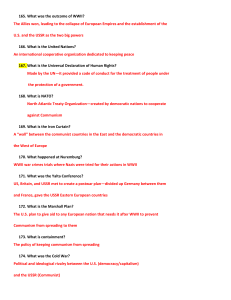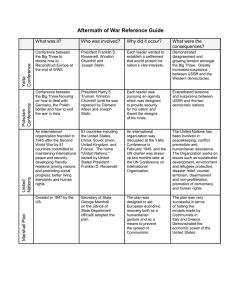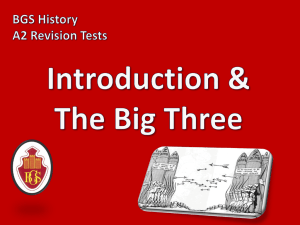2158/1 HISTORY World Affairs since 1919 MAY/JUNE SESSION 2002
advertisement
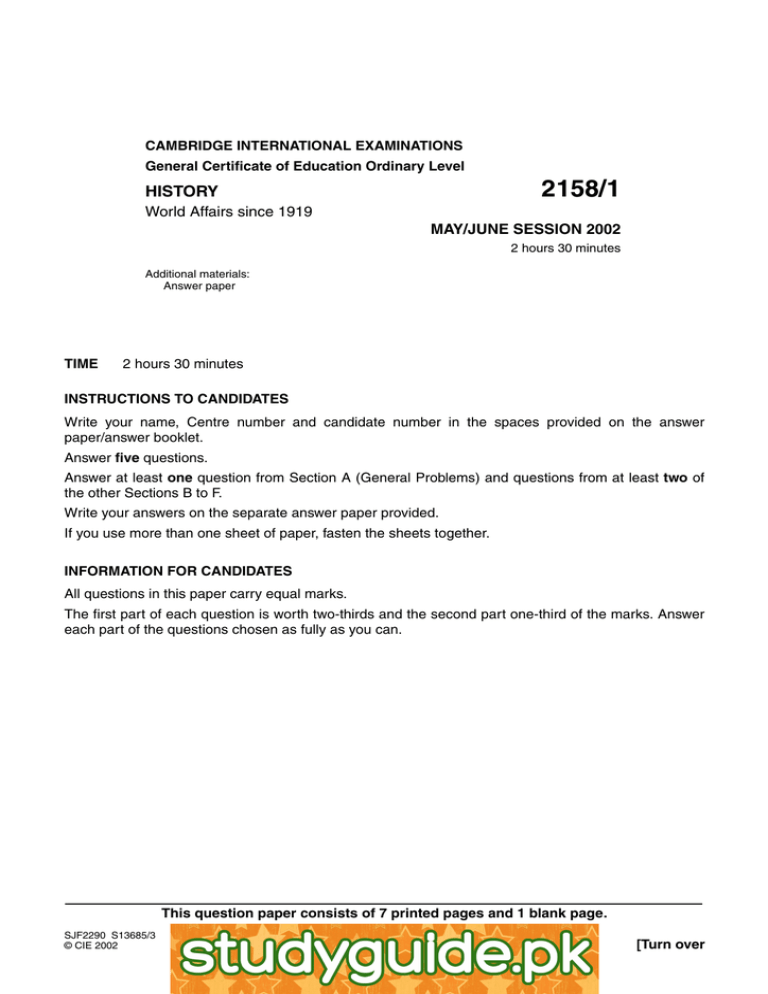
CAMBRIDGE INTERNATIONAL EXAMINATIONS General Certificate of Education Ordinary Level 2158/1 HISTORY World Affairs since 1919 MAY/JUNE SESSION 2002 2 hours 30 minutes Additional materials: Answer paper TIME 2 hours 30 minutes INSTRUCTIONS TO CANDIDATES Write your name, Centre number and candidate number in the spaces provided on the answer paper/answer booklet. Answer five questions. Answer at least one question from Section A (General Problems) and questions from at least two of the other Sections B to F. Write your answers on the separate answer paper provided. If you use more than one sheet of paper, fasten the sheets together. INFORMATION FOR CANDIDATES All questions in this paper carry equal marks. The first part of each question is worth two-thirds and the second part one-third of the marks. Answer each part of the questions chosen as fully as you can. This question paper consists of 7 printed pages and 1 blank page. SJF2290 S13685/3 © CIE 2002 http://www.xtremepapers.net [Turn over 2 Section A General Problems 1 Describe the changes made to Central Europe by the Treaties of St. Germain and Trianon. How far was Central Europe weakened by these changes? 2 Outline the foreign policy of Nazi Germany to October 1938. To what extent was Hitler’s foreign policy carefully planned? 3 Describe the military successes of Germany from September 1939 to December 1940. Why did the Luftwaffe fail to destroy the Royal Air Force in 1940? 4 Show how the Cold War developed from February 1945 (the Yalta Conference) to February 1948 (the communist take-over of Czechoslovakia). Why did Stalin follow a policy of expansion in Eastern Europe in this period? 5 Show how (a) Morocco and (b) Tunisia, achieved independence from France after the Second World War. Why did France surrender control over these two dependencies? 6 Describe the relations between the USA and the leading communist powers during the 1970s. What were the reasons for the détente in the 1970s? 2158/1/M/J/02 3 Section B Western Europe 7 Outline the domestic changes introduced by Mussolini in the 1920s and 1930s. How successful were these policies? 8 Describe the policies of the Nazi government in the 1930s towards: (a) education; (b) the economy; (c) religion. To what extent was Nazi Germany a dictatorship? 9 Outline the development of European economic co-operation from May 1950 (the Schuman Plan) to July 1973 (the incorporation of Britain, Denmark and the Irish Republic into the EC). To what extent has the EC been a success? 10 Describe the political career of Margaret Thatcher. Why did she resign as Prime Minister of Britain in 1990? 11 Describe the policies of the Mitterand administration of France, 1981-1988. Why was Jacques Chirac defeated in the presidential election of 1988? 2158/1/M/J/02 [Turn over 4 Section C The Americas 12 Describe the process by which Prohibition became law between 1917 and 1920, and show its effects on US society. Why was the law repealed in 1933? 13 Show how the lives and status of women improved in US cities during the 1920s. Explain the most important factor for these improvements. 14 Describe the following New Deal measures: (a) the Tennessee Valley Authority; (b) the Social Security Act, 1935; (c) the Wagner Act, 1935. How successful was the New Deal? 15 Outline the foreign and domestic policies of President Reagan, 1981-1989. Why did he win the presidential election of 1980? 16 Describe the career of Juan Domingo Peron to 1974. How important was his wife Eva Duarte Peron during his first presidency? 2158/1/M/J/02 5 Section D USSR and Eastern Europe 17 Describe the career of Joseph Stalin to 1929. Why had he become the effective leader of the Soviet Communist party by 1929? 18 Outline the foreign policy of the USSR from 1922 (the Treaty of Rapallo) to June 1941 (the German invasion of the Soviet Union). Why did the USSR join the League of Nations in 1934? 19 Show how Stalin dealt with the industrial and agricultural problems facing the USSR between 1928 and 1937. How far did Stalin’s rule in the 1930s strengthen the USSR? 20 Describe the relations between the USSR and her European satellites to 1960. To what extent was Yugoslavian communism different from that of the USSR? 21 Outline the domestic policies of Mikhail Gorbachev from 1985 to 1991. Why did he resign in 1991? 2158/1/M/J/02 [Turn over 6 Section E Africa and the Middle East 22 Write an account of the career of Mohammed Mussadeq from 1942 (his election to the Iranian parliament) to his dismissal in 1953. Why was he dismissed by the Shah? 23 Describe the apartheid measures introduced by the Afrikaner Nationalist governments after 1948. Why did South Africa withdraw from the British Commonwealth in 1961? 24 Outline the history of Rhodesia from December 1963 (the break up of the Central African Federation) to April 1980 (the establishment of the Republic of Zimbabwe). Why did Ian Smith declare UDI in 1965? 25 Describe the events in the former Belgian Congo from 30 June 1960 to the establishment of Zaire in 1971. How successful was UN intervention in this area during the early 1960s? 26 Write an account of the relations between Egypt and Israel from October 1973 (the Yom Kippur War) to March 1979 (the Washington Peace Treaty). How important was OPEC for the world economy during this period? 2158/1/M/J/02 7 Section F Asia 27 Describe the career of Mohandas Karamchand Gandhi to 1935. How important was his leadership of the Salt March in 1930? 28 Describe: (a) the Shanghai Massacre, 1927; (b) the Long March, 1934-1935; (c) the Sian incident, 1936. What was the importance of the Long March for the Chinese Communist Party? 29 Describe: (a) the Japanese attack on Pearl Harbor, 1941; (b) the conquest of Malaya and Singapore. How important was the attack on Pearl Harbor? 30 Outline the history of Communist China following the death of Mao Tse-tung (Mao Zedong) in 1976 to the 13th Party Congress in 1987. Why were the Gang of Four arrested after Mao’s death? 31 Describe the ‘Emergency’ in Malaya, 1948-1960. Why was the Communist rebellion unsuccessful? 2158/1/M/J/02 8 BLANK PAGE 2158/1/M/J/02
